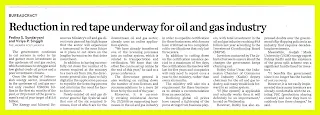The government continues to cut corners in order to try and garner more investment in the upstream oil and gas sector, which continues to struggle amid low global crude oil prices and a poor investment climate.
Once the darling of Indonesia’s energy sector, investment in the upstream oil and gas sector only reached US$ 3.96 billion in the first six months of the year, or 29 percent of the government’s end of year target of $13.8 billion.
The Energy and Mineral Resources Ministry’s oil and gas directorate general has high hopes that the sector will experience a turnaround in the near future as it plans to cut down on the lengthy bureaucracies that deter investment.
In addition to having successfully cut down the number of licenses required at the ministry to a mere six from 104, the directorate general also plans to fully digitalize the application process to expedite the licensing process and minimize the need for face to-face contact.
Newly-minted oil and gas director general Ego Syahrial said that one of the six required licenses, four of which are for the downstream oil and gas sector, already uses an online application system.
“We have already transferred one of the licensing processes into an online system, which is related to transportation and verification. We hope that the other five can be set up online by the end of this year,” he said at a press conference.
The directorate general is also working on cutting down the number of non-licenses and recommendations to a mere 26 from 50 by the end of the year. Moreover, it is currently revising ministerial decree No. 27/2008 on supporting businesses in the oil and gas industry in order to expedite certification for these businesses, which many have criticized as too complicated for certifications that only last three years.
In addition to cutting down on the certification issuance period to a maximum of five days, the certifications themselves will last for five years and companies willonly need to report once a year to the ministry rather than every six months.
The ministry will also nix a requirement for these businesses to obtain a recommendation from an association. Declining global oil prices have caused a tightening of the purse strings from business players, with total investment in the oil and gas industry reaching $9.8 billion last year according to the Investment Coordinating Board (BKPM).
Investors contacted by The Jakarta Post seem unsure about the changes the government keeps churning out. Bobby Gafur Umar, the Indonesian Chamber of Commerce and lndustry (Kadin) deputy chairman for the oil and gas industry, said manywould look forward to an online system.
“If [the system] is applicable and actually works then it will definitely be an improvement,” he said on Wednesday.
However, Bobby has also expressed doubts over the government’s flip-Hopping policies in an industry that requires decadeslong investments. Meanwhile, Gadjah Mada University (UGM) energy expert Fahmy Radhi said the existence of the gross split scheme was a significant hurdle faced by investors.
“It benefits 'the government since it no longer has the burden of cost recovery. However, it is not easily implemented since many investors are already comfortable with the existing PSC [production sharing contract] and now they have to suddenly face these changes,” he said.
Jakarta Post, Page-18, Monday, August 21, 2017


No comments:
Post a Comment